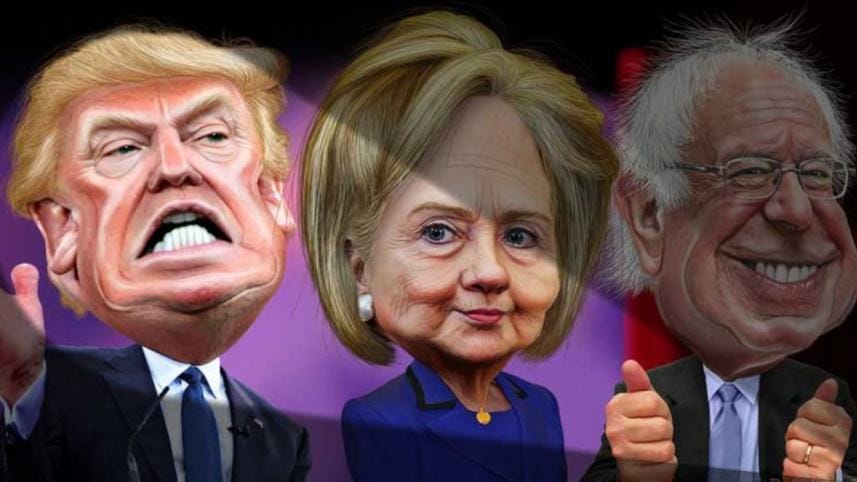Does it matter who's the next US president?

Both Ted Cruz and John Kasich have fallen by the wayside, while Donald Trump dashed to the finishing line of Republican Party nomination for the US presidential race in 2016. The suspense lingers in the Democratic Party, where the dead heat still persists between Hillary Clinton and Bernie Sanders after the latter cut into the former's lead last week. Now that the scene for the US presidential race looks less cluttered, the ultimate question for the world to ask is whether it matters if any of these candidates is the next US president.
It obviously matters for Americans. A great deal of their future hinges on who goes to the Oval Office in January. But how much will the world change if any of these three US politicians wins the most powerful job in the most powerful country? How much will it influence the future of the rest of mankind, threatened by escalating political violence, terrorism, climate change, energy crisis, water shortage and economic slowdown?
Broadly speaking, each of these candidates is different. Hillary Clinton represents the status quo, and Bernie Sanders represents the progressive left. Donald Trump is an oddball, who might yank his country back to the Ice Age with his "America first" platform. He hates Muslims, immigrants, India and China, admires Russian president Vladimir Putin and approves torturing, leaving little room for political tolerance and free market manoeuvring. He threatens to pull out of NATO, and remove the US nuclear umbrella over Japan and South Korea.
If Hillary is elected, it might mean more of the same. She will probably run her government on cruise control, hesitant to change too much in terms of speed and direction. She might continue to distance the United States from its European and Persian Gulf allies, ridiculed as "free riders" by her predecessor Barack Obama, and forge closer ties with Iran. But her election will boost the morale of women around the world by dint of being the most powerful person on the planet from their side of the gender divide.
Bernie, if elected, might give the rerun of the Jimmy Carter bonhomie and remain committed to improving the lot of the working class Americans. He is expected to be less hawkish in his foreign policy - more a pacifist than a warmonger. He might push egalitarianism and humanitarianism, while failing to tame the rowdies and the renegades swarming on the earth.
Donald, on the other hand, has the penchant for chaos that might radically upset the world order. Then again, the President Donald might be more sober than the candidate Donald. But much of the world, like many Americans, is uncomfortable with the idea of him running the White House. His unbridled tongue and uncontrolled temper evoke the memories of Russia's "Ivan the Terrible" in American politics.
The overriding question is whether the underlying implications of the US strategy will see a marked shift. The war on terror, the desire to rule the world and control its resources, pursuit of capitalism, and militarist ambition will remain the pillars of its engagement with other countries. The stage that once shifted from Europe to the Far East to the Middle East will now shift to the Asia-Pacific region. While the playground will change, it may still be the same old game.
So, whoever is elected the next US president will bring his or her style, experience and idiosyncrasies to the job. But how much will the job change? The United States will still remain the hegemonic pulpit interested in its self-interests. The ascent of Donald Trump has reflected a strain of American public opinion that favours conservative and harsh approach towards strategic alliances and international trade partners forging a new world order.
Every American president has evolved some kind of a doctrine to influence the world. The USA entered the world stage with James Monroe's namesake Monroe Doctrine to prevent the colonisation of the American continents by the European powers. Some of the doctrines had more profound and wider impact on the world than others. For example, the Truman doctrine committed US support for "free peoples who are resisting attempted subjugation by armed minorities or by outside pressures." The Carter doctrine was restricted to the protection of the Persian Gulf.
Over the years, the US presidency and prestige have diminished, reaching its nadir when George Bush lied to invade Iraq. The next US president will be caught between crisis of confidence abroad and clamour for conservatism at home. She or he might find it challenging to double-hat as the leader of the free world.
There's a mood change in America. There's a mood change in the world. It will be interesting to see who cuts to the chase first: the leader finds a new world or the world finds a new leader.
The writer is editor of the weekly First News and an opinion writer for The Daily Star.
Email: badrul151@yahoo.com




 For all latest news, follow The Daily Star's Google News channel.
For all latest news, follow The Daily Star's Google News channel.
Comments